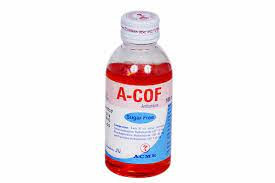Dextromethorphan + Pseudoephedrine + Triprolidine
This medication cures the following symptoms caused by a common cold, hay fever (allergic rhinitis), or other upper respiratory allergies:
- Coughing that isn't productive owing to slight throat or bronchial irritation
- A runny Nose is a symptom of a clogged nose.
- Sneezing
- Itching in the nose or throat is a common ailment.
- Eyes that are itchy and watery
- Congestion in the nose
This medication combines antitussive, decongestant, and antihistamine properties. Dextromethorphan is a non-narcotic antitussive with a central action on the cough center in the medulla that is safe and effective. Despite its molecular similarity to Morphine, it lacks analgesic and habit-forming characteristics, and has little sedative activity in general. Decongestant phenylephrine shrinks blood vessels in the nose stream. Phenylephrine is used to relieve stuffy nose, sinus, and ear symptoms caused by the common cold, flu, allergies, sinusitis, and bronchitis for a short period of time. This drug works by reducing swelling in the nose and ears, which relieves pain and makes it easier to breathe.Triprolidine is an antihistamine that helps to reduce allergy, hay fever, and cold symptoms. Rashes, watery eyes, itchy eyes/nose/throat/skin, cough, runny nose, and sneezing are some of the symptoms. It's a pyrrolidine-class competitive histamine H1-receptor antagonist with modest central nervous system depressive characteristics that can make you sleepy. It helps dry up some body fluids by antagonizing another natural molecule called acetylcholine, which relieves symptoms like watery eyes and a runny nose.
Adults & Children over 12 years: 1 teaspoonful (5 ml) 4 times a day every 4 hours interval.
6-12 years: 1/2 teaspoonful 4 times a day every 4 hours interval.
Use in children and adolescents: A physician's advice should be obtained before administering this combination to children less than 6 years.
Taking this medication with certain MAO inhibitors may result in a significant (potentially fatal) drug interaction. During treatment with this drug, do not use isocarboxazid, methylene blue, moclobemide, phenelzine, procarbazine, rasagiline, selegiline, or tranylcypromine. Most MAO inhibitors should be avoided for two weeks before starting this treatment.
It should be avoided in people with liver illness or asthma, and it is contraindicated in patients who are on monoamine oxidase inhibitors or who are about to cease using them.
It can make you drowsy and cause constipation. GIT discomfort is one of the other possible adverse effects. There is no evidence of morphine-type physical dependence.
This medication may make you sleepy. If you are afflicted, do not drive a car or use machinery. While taking this drug, stay away from alcoholic beverages. Patients with epilepsy, prostatic hypertrophy, glaucoma, hepatic disease, hypertension, heart disease, diabetes, or hyperthyroidism should use with caution. If symptoms persist for more than a week or are accompanied by a high fever, see a doctor before continuing to use.
Combined cough suppressants
Store in a cool and dry place (below 30°C temperature), away from light. Keep out of the reach of children.
Pharmaceutical Name
ACME Laboratories Ltd.




